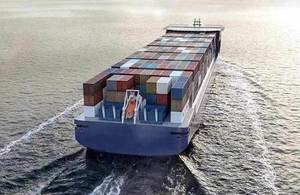Clean maritime revolution starts voyage
First meeting of the clean maritime council who will make the plan for a zero emissions UK maritime sector.

Image of a Rolls Royce hybrid smart shipping vessel.
Experts on clean shipping met today (15 October 2018), to plot the route to zero emissions for the UK maritime sector on the first day of Green Great Britain Week.
Minister for Maritime Nusrat Ghani opened the first meeting of the Clean Maritime Council, which will devise a strategy to reduce greenhouse gas emissions from the sector and to improve air quality on and around our waterways, ports and shipping lanes.
The government is clear on the need for action on emissions from shipping. Air pollution is the fourth greatest threat to public health after cancer, heart disease and obesity. In 2016, domestic shipping accounted for 11% of the country’s nitrogen oxide emissions. At the same time, CO2 emissions from the maritime sector must be reduced in order to ensure we meet our targets on climate change.
The Council has an important role in addressing these issues, bringing together experts from across the maritime sector - from industry leaders developing greener vessels, to academics studying the economics of emission reduction.
Maritime Minister Nusrat Ghani said:
The UK maritime industry has a vital role in improving air quality on and around water, and council members will be looking at innovative and practical ways to reduce emissions from the sector.
The Clean Maritime Plan will bring new opportunities for Britain’s businesses to design, develop and sell green solutions to this global challenge.
The UK is already actively developing plans to reduce emissions from shipping, for example:
- hybrid ferries using battery power alongside traditional engines are being used between Portsmouth and the Isle of Wight and in Scotland
- shore-side electricity is already in place at Portsmouth (MOD), Fraserburgh and Brodick to reduce engines running at ports
- Innovate UK is funding a project in Orkney to directly inject hydrogen into the fuel supply of a ferry
The country also played a leading role at the International Maritime Organization in setting a global cap on sulphur emissions and establishing a new global target to cut shipping’s greenhouse gases by at least 50% by 2050. The Council further demonstrates the serious commitment we are making for the future of the sector, ensuring the UK can benefit from the global shift to zero-emission shipping.
The environment is also one of the main strands of the government’s Maritime 2050 strategy, a long term look at the opportunities for the sector for the next 30 years.
The clean maritime plan will be published next year and will include policies to tackle emissions of air pollutants and greenhouse gases from shipping, while ensuring the UK can reap the economic benefits of the global transition to zero emission shipping.
The council members are:
- Mr Roger Hargreaves (Chair) – UK Department for Transport
- Ms Mattea Todd (Secretariat) – UK Department for Transport
- Mr David Balston – UK Chamber of Shipping
- Captain Fran Collins – Red Funnel Group
- Professor Alex Duffy – MarRI-UK
- Ms Angie Farrag-Thibault – Clean Cargo Working Group, Business for Social Responsibility
- Ms Diane Gilpin – Smart Green Shipping Alliance
- Mr Chris Hill – ORE Catapult
- Mr David Loosley - Institute for Marine Engineering, Science and Technology
- Mr Gerry Marshall - Ferguson Marine
- Mr Tim Morris - UK Major Ports Group
- Mr Nick Power – Engie
- Mr Mark Ranson – National Workboat Association
- Dr Tristan Smith - University College London Energy Institute
- Mr Jos Standerwick - Maritime London
- Baroness Bryony Worthington - Environmental Defence Fund
The council is also advised by representatives from:
- Innovate UK
- the Committee on Climate Change
- the Department for Transport
- the Department for Environment
- Food and Rural Affairs
- the Department for Business, Energy and Industrial Strategy
- the Maritime and Coastguard Agency
Updates to this page
-
Maritime and Coastguard Agency added as a body advising the council through representation.
-
Clean maritime council members added plus information on CO2 emissions.
-
First published.